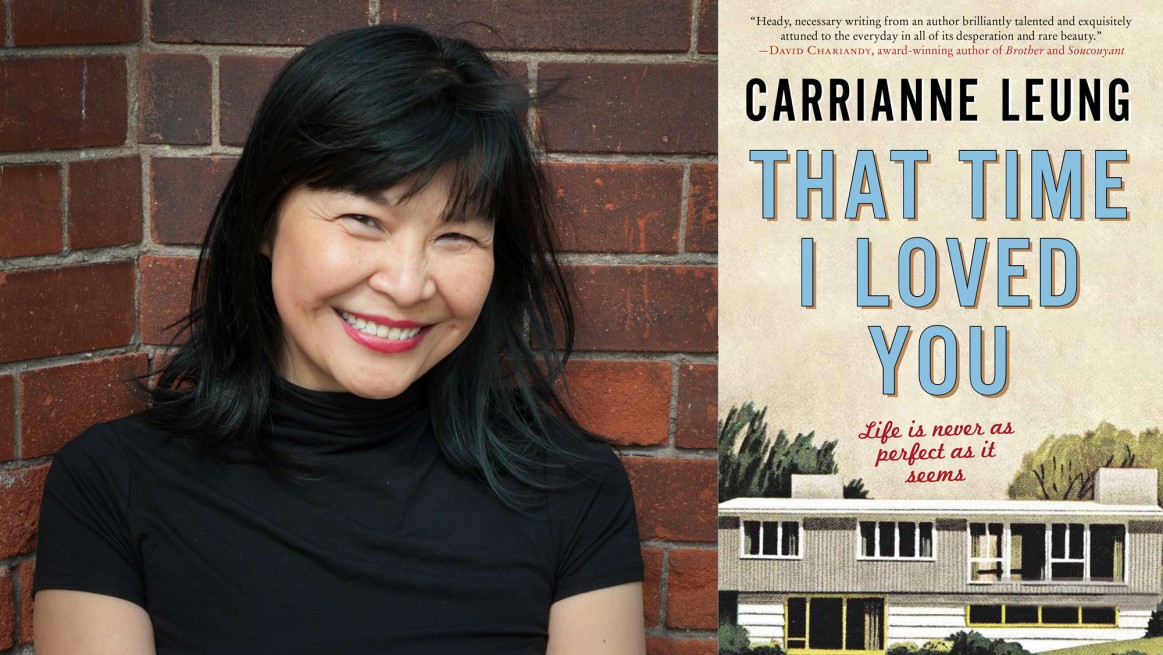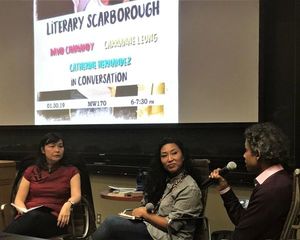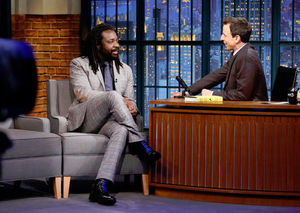Creative Life
By Carrianne Leung
I was asked to give a keynote address at the launch of the student literary journal, Scarborough Fair at the University of Toronto Scarborough. The theme was “The Creative Life”. As their Writer in Residence, I wanted to give the students something practical. I didn’t want to wax poetic about a life that was frankly on most days, also kicking my ass.
So, instead of a talk, I shared a list of 70 things that I have learned so far as a writer. Do not worry! The 70 are not so daunting, and nothing about this is prescriptive. I suppose this is the thing about having a creative life – there is no simple formula for you to follow. In the process of writing this list, I also crowd-sourced some of my writer friends, so I included their advice too. They are just tips for emerging writers that hopefully, will accompany them well along their journey.
- Carry a notebook with you at all time. You can get very nice ones at Dollarama for $1.25. If you feel very precious about it, you can get a Moleskin for $30. But I assure you - your choice will not determine whether you produce $1.25 writing or $30 dollar. Go for Dollarama.
- Canisia Lubrin told me she once wrote on a banana leaf. She wants me to tell you, moleskin or no skin, just write.
- Forget the paper or banana leaf, the writing instrument is probably more important. I like those fine-liners that glide across the paper with hardly any drag, making that perfect little scratchy sound. That noise makes me feel serious. But in a crunch, anything will do. I have also used eyeliner, lipstick, kids’ crayon and soya sauce. The soya sauce was at a wedding banquet, and I dipped a chopstick in it like an inkwell. It worked ok, but the napkin that I used was a bit too eager for the stain, so it came out quite blurred.
- Now that you have spent enough hours procrastinating and looking for the perfect tools, you need to carry these items with you at all time. While you may prefer writing on a laptop, inspiration will hit you anytime and anywhere – standing in that long line at Tim Horton’s, riding the bus to campus, sitting on the toilet, even sleeping. You want to be ready to net all the words, images, ideas to develop more fully later. Also, the weight of those writing instruments in your bag will remind you of your purpose - to write.
- Consider the notes and fragments you write as evidence of a mind/heart/spirit wide-awake.
- I get asked a lot of questions, but people never ask the most basic one: Why do you write? You know it ain’t for the money. My friends hear me whine enough about how hard it is. So why? Here is the reason: I write because I am in love with the world and compelled to express this through language. Consider your own reasons and hang on to them as touchstones.
- I know for some of you, writing is survival. You write to see yourself emerge because nothing else shows you that you really exist and matter. I see you.
- Tell the truth even when you write fiction.
- Get rid of the romantic notions of writers who sit in Parisien garrets or New York lofts penning scripts that flow effortlessly out of feather quills or Macbook Airs. Writing looks more like this for me – bed head, sweat pants, coffee stains and the occasional howl of anguish.
- Most of the time writing is a slog. Expect slog. Writing is not for the faint of heart, but remember, you have a lion of one.
- Read. Reading will teach you how to write. Reading is also its own form of work and creativity. Excel at it.
- Reading for resonance is great. When you connect with something, you feel seen. But also read for dissonance. Dissonance will teach you about what you can’t yet see.
- If there are books you love, hold them close to you. Reach for them when you need inspiration. When I am writing, I stop reading books except for a select few that I reach for as reminder of how utterly magnificent the written word can be. Never stop marveling at art.
- Study writers you love. Deconstruct their texts to learn their particular mastery.
- But also, don’t try to be like them. Be you. There is only one you, and we need your stories and poetry and narratives. No one else can give that to us.
- Show up. When people learn that I am a writer, so many of them tell me that they have a book or two in them. I am sure they do. BUT. It’s not a book if it hasn’t been written. Writing is labour and attention and time. The difference between wanting to write and having written is in the showing up.
- Don’t fret over that thing called, “talent” too much. Just do the work. Remember, the most accomplished writers are probably also facing the slog this very minute, dressed in ripped PJs and sporting their own bed head. You can be sure that they are doing the work.
- There is no wasted writing even if the majority of what you write will never make it to the final pages. It may take you 50 pages before you reach the one that gives you the beginning of the story. Still, the 50 were necessary.
- You don’t have to completely kill your darlings. Stuff the pages that don’t make it to the final draft in a folder on your laptop. Name it. I call mine the Parking Lot. Those storylines and that minor character or that beautiful imagery may get to live another day. If those darlings spark joy, it’s ok with Marie Kondo and it’s ok with me.
- Move if you can. Go outside and walk. Walking does something interesting and rhythmic with your brain. Or point your toes in your favourite direction or rotating your wrists. Remind yourself that you are a body.
-
Coming to voice is in the process. You have to keep writing to keep learning how.
- I heard Cherie Dimaline once say that writing is a kind of magic. There will be moments when you will be elevated. You will feel a kind of electricity that is only reserved for those who dare to be creative. Hold on to those moments and have faith that magic will touch you again when you doubt.
- In fact, maybe the craft of magic and the craft of writing are not so dissimilar. Both are going to require hours of mistakes and failures to make perfect. Everybody loves a magic show and want to be a magician, but you know that what happens behind the scene is what makes what happens on the stage possible.
- Facebook, Twitter, Instagram and Youtube will not write your essay, story or poem for you. As far as I know, there is no app for that. Shut it down when you write. Solitude is part of a writing life.
- There is a host of fears that comes with living on the page. The fear may come at the beginning, it can appear in the middle, or it can come with having written. If you are afraid, you are probably doing it right. Writing can be terrifying.
- Along with fear, other feelings will arise. Let the feelings come. There are no negative feelings or positive feelings. They are just feelings. Consider them all your teachers and write with them and through them.
- Be humble.
- You are not a machine. Productivity means different things when considering creative work. Reject the neoliberal definition of it and re-define what being productive means for you.
- I don’t believe in writer’s block. I think it’s an overgeneralized term that may mask what is really happening. Are you feeling tired? Hungry? Stressed out because you don’t know if you’ll make rent? Are you scared of the blank page? Are you consumed by self-doubt and worried your work will be “no good”? Are you constantly thinking about who will read it and how they will react? Are you writing to win the Giller, the Griffin or even the Nobel Peace Prize in Literature? All these things would trip someone up, but I wouldn’t call them writer’s block. Know with more exactness what is happening for you, and then start addressing it.
- Catherine Hernandez says, stop trying to prove you are a writer and just tell us the story.
- Sharon Bala says if you write, you’re a writer. Stop using the verb to describe yourself, take ownership of the noun!
- Even when you are not pen to page, you are still writing. Notice things in your surrounding; be curious about people, even those who annoy you. Learn the names of flowers and cloud formations. Read a newspaper, talk to cats, share a meal with a pigeon. Lean on a tree and ask it what it’s like being a tree. Invite things in. You will produce richer writing. And you will have a richer life.
- Being curious is one of our most useful traits. I hope I never lose my laptop because my search history would scare the hell of out of someone.
- Janie Chang says FINISH something. If you don’t finish something, all you have is potential, and an agent can’t sell potential.
- Open yourself to the human experience because whatever you write is a meditation on what it means to be human. Yes, even if you are writing about werewolves and aliens and teenage vampires.
- While craft is muscle building, there are moments of mystery in the creative process. Some people call it a muse, inspiration, even god. When I told Lee Maracle that sometimes I feel haunted, she said, of course. Writing is when her ancestors come to tell stories. So now, I accept that something sacred and divine is also at play.
- There will be ghosts too. Don’t be afraid. They just want to talk.
- Protect your writing time. It is as important as going to the dentist, showing up for a shift at work, going to class. Do not forsake it.
- Feedback will come in all forms. Some people may love your work while others will not. If everybody loved you, that would just be weird. You are not writing for everybody, and that is OK.
- I say this even as one bad reader’s review will feel like a knife in my heart making me forget all the good reviews and burrito myself in my duvet …. We do not have to be made of armor.
-
Invest in a really good duvet.
- Allow yourself to write shit. Seriously, write the shittiest shit you can. Writer, Anne Lamott says you must especially strive to write shitty first drafts. Shit makes things grow. Look at manure.
- You will feel vulnerable while receiving feedback. Take everything in and decide what you need and what you don’t. Some feedback will hit you hard. Some may feel unfair. All of it will strengthen your work because it will clarify your intentions.
- You may have created the work, but you are NOT your work. Learn to have a critical distance or else you will take everything personally as a comment on you and not be able to move on with using feedback as a writer.
- Not everybody will “get” it. Is it your writing that stands in the way of them understanding it? Or is it something else? Is it something about the position of where you are as a differently embodied person? Is it your gender, your race, your sexuality, your disability, your poverty? Your truth? That is another can of worms. If you are writing from a marginalized place, you may face walls. Learn to discern what feedback will help you and what is attempting to silence you. Always, always, hold on to the integrity of your own truth, and let that guide your process.
- I once had a mentor who refused to email and instead sent me his feedback on lavender pages of paper that smelled strangely of cinnamon. On these purple pages, he ripped my work to shreds, and I stopped writing for a while. I cried, I thought it was time to shelf my dreams and I tried to let it go. But I couldn’t. Much later, I read those pages again and did not find anything helpful or constructive in them. That was when I realized that some people are just assholes.
- There are conventions. You are allowed to break them, but do it well and no one will get on your case about it.
- My first draft is for myself. You must allow yourself to be the gravitational force. Let the sun revolve around you. In the moment of fresh writing, you are the creator. Make your own weather.
- In the next draft, I write for the people I love. After that, I move onto strangers who I may possibly love if I knew them.
- The question of audience is not as cut and dry as you think. You will have people who you think should love your work who won’t and people you would never expect to connect with it, do.
- Also, don’t underestimate readers. They do not need everything spelled out for them. What you leave out is as important as what you put in. Leave the text porous because you do not know how a reader will enter it.
- Do not hover like a helicopter parent. The writing will have to stand-alone sometime.
- When you publish your work, let it go. Let it have other lives as it is meant to with other people. They may not read it as you intend, but they will be read it as to how they need to. I accept that my books have lives after me and don’t truly belong to me anymore.
- If you embark on creative work, you will experience failure. Fail well. Fail spectacularly. David Chariandy writes like this. He relies on failing in order to get it right in the meticulous revisions.
- Do not forget about joy. I see a lot of emerging writers who seem to be in much pain while writing. Writing is painful sometimes, but it’s also an incredible joy. Please do not forget that.
-
Sometimes, the story is stronger than you. Get out of its way and let it happen. Let the story have the space to find itself before you pre-judge it or give up. It may not take the shape you assumed it would or your characters will behave in ways you didn’t intend. But let it happen anyway. Marlon James talks about this as a duty to story. We serve the story. The story does not serve us.
- The page is one of the few places where I can be free. That kind of self-sovereignty is rare. We should all be chasing our freedoms. Don’t let anyone take that away from you, including yourself.
- It’s not a race. You clock your own time. What the person beside you is doing is inconsequential to your own journey. Stay in your lane. You will get jealous and punch pillows because “other writers” are getting things done faster or more successfully than you. Give yourself a minute to feel the feels. Go to the duvet, if you have to. When the rage has passed, congratulate them on their publication, their award or their new dog. There is a time and space for all of us. Eat a bowl of noodles followed by a bag of chips. That works for me.
- While it’s not a race, persistence is key. It’s not speed. It’s the audacity and patience and craft that matter.
- Don’t worry about the imposter syndrome. We all have it.
- There will be good days and bad days in writing. Protect your mind and heart on the bad days. They will pass.
- To say, I am a writer is not to inhabit an identity. It’s a practice just like other practices. Don’t be too precious about it. It doesn’t make us any better or worse than anyone else. But know you have a special responsibility with words, to be artful and concise with language, to reflect back to people what you see. Honour that purpose.
- Most of us are not full-time writers. Lindsay Wong wants me to tell you it’s hard. If this will be your profession, know that you will always have to have a side hustle, a day job, be a member of the gig economy. It’s not a stable life, but its rewards can be measured by other metrics.
- You may find sometime in your life that you will work in a job that feels like it’s slowly killing your soul. You may feel too stressed or distracted to be a creator. You may think to yourself – “Why am I doing this? I should be a writer!” Have faith. Don’t be so hard on yourself. Keep carrying your notebook even if you can’t write in it every day. You do what you need to do to survive, and know that your words are waiting if you choose to pick up the pen again. Your readers will be here when you are ready.
- I have done a lot of things for pay besides from writing, and I still do. ALL of these things have contributed to my life as a writer. Even those jobs, experiences, relationships that sucked all poetry and beauty out of me made me a writer too.
- Go to literary events. Meet people. This does not mean you have to schmooze or “network”. People who attend literary things are some of the nicest folks you will meet. There are a bazillion things happening every week in the city. Soak up the writerly vibe. I guarantee that you will feel jazzed to write.
- If there is an open mic, jump on it. It’s a cheaper adrenalin rush than riding the rollercoaster at Wonderland and a lower risk than confessing love to your crush.
- Be generous. We do much of this work alone, but this does not mean that it doesn’t take a village. Be a good friend to other writers, be an ally, a contemporary, a mentor, a student and a reader. Build a sustainable community and uplift each other.
- Getting published is hard. If you don’t get published, it’s not always a comment on the quality of your work. There is a constellation of reasons why your work was not chosen. Maybe a particular editor didn’t connect with your work or it wasn’t a good fit with that lit magazine. Whatever the reason, know that this is just part of a writer’s life and rejections are a badge of honour. It means you did the work, you showed up, and you put it out there. There will be a next time and a time after that and even one after that. Just keep writing.
- Publishing will not solve all your problems, but I hope it makes you proud.
- Remember yourself as the reader. Think of what other writers’ work have meant to you – they made you laugh, they soothed, they expanded your mind to possibilities when you thought there was nothing left to discover. Don’t underestimate that your words will land where they need to. It is a worthy thing that we do when we endeavor to do the same for others.
- We create because we love something. Let love drive you. You may be thinking, OMG, Carrianne, how cheesy! You mentioned love so many times already! But listen, I’m not talking about some cheap Taylor Swift kind of love. I’m talking about love that swoops and thrums and heals. I’m talking about revolutionary love. Radical love. Deep and wide and expansive love. I believe in literature and its possibilities. I also believe in love.
The world is on fire. Whatever you write, whatever you do, I ask please, push love forward. Shift, conjure, manifest and make a good place, a better place with your words. And then, love the world some more.
Your CanLit News
Subscribe to Open Book’s newsletter to get local book events, literary content, writing tips, and more in your inbox
The views expressed by Open Book columnists are those held by the authors and do not necessarily reflect the views of Open Book.
Carrianne Leung is a fiction writer and educator. She holds a Ph.D. in Sociology and Equity Studies from OISE/University of Toronto. Her debut novel, The Wondrous Woo (Inanna Publications) was shortlisted for the 2014 Toronto Book Awards. Her collection of linked stories, That Time I Loved You, was released in 2018 by Harper Collins Canada.







